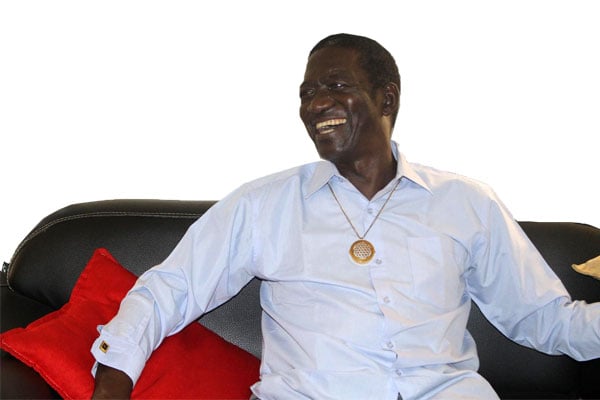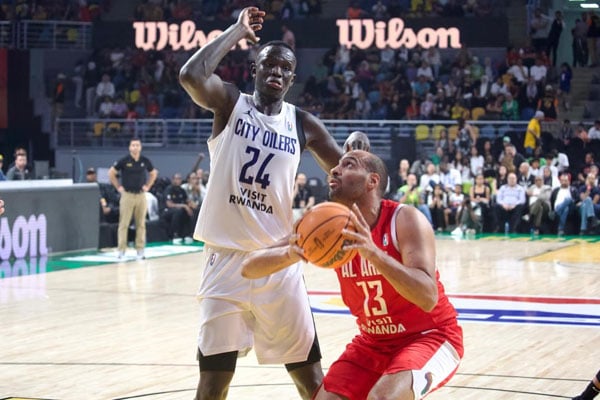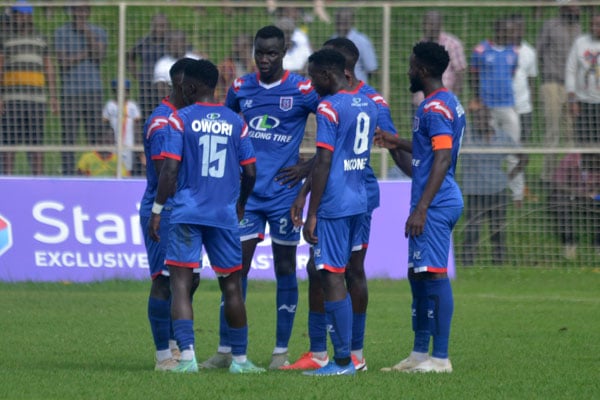Matte, Ebalu and Kirumira were prolific strikers who took East Africa by storm

Smile Of an assassin. Ebalu won the 1968 topflight league in Uganda with Prisons and was always a truly feared striker. PHOTO/JOHN BATANUDDE
What you need to know:
Household Names. Henry Matte played for UEB and Express. Charles Ebalu spent his career at Prisons and Kenyan side AFC Leopards, a side that also once had Peter Kirumira. The latter also played for Express. All three were lethal strikers who could also play in other positions. They took the East Africa region by storm.
CHARLES EBALU
Ebalu was such amazing talent and his biggest moment was bagging a quintet of goals for Uganda Cranes in a single match more than once in the 70s.
That honour came against Somalia, Burundi and Zanzibar.
His name ranks high among the best players to feature for Prisons, one of the strongest of that era.
Some of those stars of yesteryear include Parry Oketch, Peter Okee, Stephen Baraza, Edward Semwanga, Ben Ezaga and Abbey Nasur among others.
He joined Prisons in 1970. That year, while he was undergoing a refresher course in law at Makerere University, Ebalu was approached by the Uganda Prisons administrators.
The conversation involved convincing him to quit the prestigious course and in return take up a job with the government agency.
The logic was simple; since Ebalu was studying to have a bright future by earning a living from a well-paying job, then why wasting time at Makerere instead of joining them and start earning a fat salary straight away?
It didn’t take a lot of convincing. He quit university and immediately underwent the mandatory nine-month training at their Luzira Staff College. Upon completion, Ebalu became a cadet ASP (Assistant Superintendent of Prisons) which guaranteed a good salary.
The fruits were instant. The club was instantly transformed into becoming one of the most feared in the national league.
The national team – Uganda Cranes – set up noticed too and he was called up and there he found stars like Jimmy Kirunda, Ahmed Doka and Ashe Mukasa.
When Cranes travelled Malawi as a guest team to mark Malawi’s independence anniversary, Ebalu found a moment to treasure for life. Not only was it the day then-President Dr John Hastings Kamuzu Banda declare himself, Ebalu and Denis Obua tormented the hosts so much that the hosts offered each a Malawian lady to take home.
They both turned down the generosity which is was common in Malawian culture as they rewarded good results with beautiful daughters believed to be virgins at the time.
In of the three games he scored five, Burundians fans in Bujumbura carried him shoulder high despite having mercilessly executed their team. His career here didn’t last long. Being a senior Prisons officer, word went around from friends in the army and notably from Ali, a Nubian playing with Prisons that his life was in real danger.
Apparently, Ebalu and some top officers were being accused of protecting political prisoners jailed in Luzira from being tortured. He escaped to Kenya through the Busia border. “Not to arouse any suspicion, I left everything in the house intact, took a taxi to Busia from where I tactfully walked across the border unnoticed with some other people,” Ebalu says.
“Once inside Kenya, I felt relieved even though thought of a hard time ahead of me in a foreign land.” What Ebalu didn’t know then was that it would again be his football talent to save him.
Those few years he had played for the Ugandan national team made him a well-known figure through the East African region.
So when Ebalu stepped on Kenyan soil, a word went around with some top Kenyan clubs learning that the dangerous Ugandan striker had fled and was in town.
A top Kenyan side Abaluhya United (now AFC Leopards) moved fast and signed Ebalu.
“I was indeed saved by my football talent which made my life in exile a comfortable one, unlike many Ugandans I found there,” he reminisces. Leopards also got Ebalu a job with Business Machine Ltd and after proving himself they found him even a better paying one, becoming a manager with at Rank Xerox. This turned Ebalu into a capo, for he was earning two salaries, one for playing football and another one for working elsewhere.

Bulldozer Defined. Matte was equally talented and lion hearted. Things like the much-feared aerial battles were an oat meal for him. PHOTO/COURTESY
At the end of the 1979 liberation war that ousted Idi Amin from power, Ebalu returned home. He never played serious football again but decided to go back to Makerere where he completed his Law degree course and later proceeded on to the Law Development Centre. With his Law degree secure in his bag, Ebalu shortly afterwards left for U.K where he practiced for some time.
EBALU FACTFILE
(ACHIEVEMENTS)
l With St. Mary’s College Kisubi, he excelled at National Soccer Schools Championships.
l He played for Prisons FC and AFC Leopards of Kenya.
l He joined Prisons FC while a First Year Law student at Makerere University.
l On joining the Uganda Prisons service, he underwent a short course and was appointed a senior cadet officer.
l Ebalu won two Kenya National League Championships with AFC Leopards of Kenya.
l He was a sharp striker and very good in aerial balls.
l During his career, he scored five goals for the Cranes in three different matches.
HENRY ‘BULLDOZER’ MATTE
Matte is undoubtedly rated among the most feared footballers to have graced the game in the East African region alongside Polly Ouma, Denis Obua, plus Kenyans Joe Kadenge, Jonathan Niva and Madengwa.
The name Matte, The Bulldozer, to thousands of sports listeners on radio Uganda was magical. It meant something special was about to happen for Uganda Cranes.
Matte as a player was so dedicated that teammates sometimes had a belief that without him, the game was lost.
On radio, the sweet voice of football commentator Mike Salis Sebalu shouting “Hatari” meant The Bulldozer was on rampage.
All he did was play well, hard and win. That’s all that mattered. Strong as an ox, Matte virtually played in every position as he was gifted with the ability to use both feet.
Matte hardly lost any tackles. During the 60s, a story is told of a Zambian midfielder who thought Matte was a piece of cake and challenged him only to break his leg into two.
If it meant sweeping the ball and the goalkeeper into the net, Matte would do it. In fact, a Uganda Boxing Federation (UBF) official once joked that if Matte had been in the national boxing team, Uganda would definitely win a lot of medals.
Though the tag name of Bulldozer seemed to give Matte an image of a brutal player, he was instead a friendly and approachable player.
At club level, Matte first became popular while playing for the defunct Uganda Electricity Board (UEB) FC, a club that David Otti also once played for.

Delight To Watch. Kirumira wheels away in celebration after finding the back of the net for Express against SC Villa at Nakivubo Stadium in the 1974 National League. He was the top goalscorer of the season with 14 goals. PHOTO/FILE
He left the club with many other players when then UEB’s sports loving managing director Erisa Kironde went into exile in 1972.
Consequently, Matte went to Express and was part of the team that won the 1974 and 1975 league titles.
He retired from football in 1977 when Express was banned.
During his colourful career, Matte was voted Uganda’s footballer of the year on two occasions while the Buganda football association voted him their player of the year in 1966.
It was in 1961 when Matte was first summoned to the national youth team, the very year the team was formed alongside players like Parry Oketch, George Bukenya and Ben Mukasa.
He made his senior debut on December 12, 1963 when he captained the Cranes in a friendly match in Nairobi against Kenya organized as part of celebrations to mark Kenya’s Independence Day.
The Cranes won 3-2 with Matte scoring the third. That made Matte a regular for the next eight years. He was never substituted.
In 1964, against Egypt in the All Africa Games qualifiers, Uganda lost 4-0 to the North Africans in Cairo during the first leg match.
During the return leg at Nakivubo, Matte breathed fire by scoring two goals and setting up three others for the Cranes to massacre the Pharaohs 5-0 and qualify for the All African Games hosted by Congo Brazzaville in 1965.
Matte later played a pivotal role helping Uganda win a couple of the East African Gossage Cup – today’s Cecafa Senior Challenge Cup – titles between 1964 and 1971.
MATTE FACTFILE
(ACHIEVEMENTS)
l Played for UEB and Express FC.
l Won the league with Express in 1974 and 1975.
l Played for Cranes from 1963 to 71
l Scored two goals and set up three when Cranes beat Egypt in a 1964 All African Games qualifier.
l Featured for Cranes in 1965 All African Games in Congo
Brazzaville
l Won Gossage Cup with Cranes.
l Was voted Uganda’s Footballer of the Year twice.
l Played for Bulemeezi County in the Masaza Cup when still a student at Nandere Junior School.
l He was a very strong player who could virtually play in almost every position.
PETER KIRUMIRA
Kirumira made history by playing for two clubs in two different countries around the same time as you will discover later.
He was such a remarkable striker that used to terrorize even those defences that were considered unbreakable.
Kirumira transformed games from nothing.
When teammates and the opposition needed to cool their tempers, he stepped in with funny jokes.
His peak was in 1972 when playing for Abaluhya United (later AFC Leopards) of Kenya.
How did he get there? He happened to be a student at the East African Railways Training School (RTS) in Nairobi doing a course in Mathematical Engineering.
Ironically, by the time Kirumira left Uganda in 1970, he was playing for Kasese District Combined XI and was almost unknown.
Leopards spotted him during a friendly match the following year. Opening his way to become a real star in the Kenyan league.
During holidays, Kirumira would return to Kampala and play for Express in the Ugandan league.
Actually, it was Kirumira and other players like Ibrahim Dafala, Ali Kiton
KIRUMIRA FACTFILE
(ACHIEVEMENTS)
l He played for Express and AFC Leopards of Kenya.
l Played for Express FC and AFC Leopards of Kenya around the same time.
l Won the league with Express FC in 1974 and 1975.
l Was summoned to the Cranes team in 1972 making the Brazil Tour
l Was the Ugandan league top scorer in 1974 with 24 goals.
l Became well known for strategically positioning himself in the opponents’ box and accurately beating goalkeepers.
l In 1979 after the resurrection of Express FC, he worked hard to get the club back on its feet.
l After retiring he helped introduce Express FC feeder team, Wembley Boys FC and was its pioneer coach.
sa and Bumbakali that were in 1973 entrusted with what appeared a huge task of saving a ramshackle Express side from relegation to the lower division.
This was before the league was eventually suspended and never completed.
A year earlier, Kirumira had won a place in the national team and was very lucky to join at the time when the team was about to make that historic tour of Brazil. Kirumira’s fame grew when Express launched a great onslaught at the national football league title in 1974.
He spearheaded the club to their first league honours that season doing it in style by emerging the top scorer with 24 goals, a record that was smashed by Police’s Denis Obua the following year.

Delight To Watch. Kirumira wheels away in celebration after finding the back of the net for Express against SC Villa at Nakivubo Stadium in the 1974 National League. He was the top goalscorer of the season with 14 goals. PHOTO/FILE
The year, 1974, will remain unforgettable in the league’s history.
Express was to face KCCA FC in a vital second round match and Kirumira happened to be away on studies in Nairobi.
He was sent an air ticket and hastily brought back to Kampala to feature for Express. He didn’t disappoint by giving Express the lead in a 3-3 draw in a match.
Kirunda’s equaliser led to the death of an Express fan! In 1979, when Express resurrected after that 1977 infamous ban, it was Kirumira who did the donkey work to get Express back on its feet. Later, after hanging up his boots, he helped introduce Express feeder team – Wembley Boys – and was the pioneer coach.
He died on June 14, 1985 with all league matches played on that day observing a minute silence in his memory.




